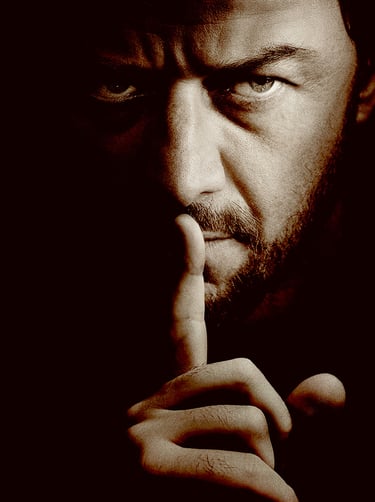Movie Review: Speak No Evil (2024) – A Disturbing Exploration of Morality, Fear, and Power
Speak No Evil (2024) is a psychological horror film that explores the terrifying power dynamics of manipulation and moral corruption, with James McAvoy delivering a chilling performance as the charismatic but sinister antagonist. The film gradually builds tension through subtle interactions and mounting discomfort, drawing viewers into a slow burn of psychological unease. It examines how ordinary individuals can be coerced into compromising their morals under pressure, making the horror both personal and relatable. With a satisfying conclusion that prompts reflection on human nature, Speak No Evil is a must-watch for those seeking a horror film that delves deep into the complexities of evil and power.
MOVIE REVIEW
Amber Dean
4 min read


A Layered Psychological Horror
In the realm of psychological horror, few films manage to engage viewers on such a deeply personal level as Speak No Evil (2024). The movie’s slow-burn tension and chillingly relatable depiction of evil make it a standout in its genre. Directed by James Watkins and starring James McAvoy, the film dives into the dark recesses of human morality, power, and fear, exploring how societal norms, personal boundaries, and unchecked authority can distort the human psyche. The haunting atmosphere, combined with McAvoy’s masterful portrayal of the antagonist, draws on real-world fears of manipulation and control, creating a visceral experience that leaves an indelible mark long after the credits roll.
James McAvoy’s Chilling Performance
James McAvoy’s portrayal of the antagonist in Speak No Evil is one of the most compelling aspects of the film. Channeling the essence of manipulative and toxic figures like Andrew Tate, McAvoy expertly navigates the balance between charm and menace, giving his character a complexity that goes beyond simple villainy. His performance is not just terrifying in the conventional sense; it’s unnervingly familiar, which makes it all the more unsettling. There is a calculated warmth and charisma to his character that draws others in, blurring the line between genuine affection and sinister manipulation. McAvoy’s ability to portray this psychological duality speaks to the character’s ability to prey on the vulnerabilities and desires of those around him, leading them down a path where moral compromise seems inevitable.
The psychological depth McAvoy brings to the role draws parallels to figures who use psychological manipulation to exercise control—charming yet coercive, his character plays on the instincts of those who wish to please or feel accepted. This dynamic creates a tense, simmering dread in the film, as viewers become uncomfortable not just with the character’s actions but with their own possible reactions to similar individuals in their real lives. Speak No Evil forces the audience to question how easily one might fall under the influence of a person who mixes affability with exploitation.
The Build-Up of Tension: A Study in Psychological Strain
The film masterfully crafts an atmosphere of discomfort, allowing its tension to grow gradually rather than through overt scares. From the very first moments, Speak No Evil lures the audience into a false sense of security, presenting normal situations that gradually escalate into unsettling confrontations. This deliberate pacing pulls viewers in, amplifying the sense of unease with every interaction. The tension builds in a manner that feels almost suffocating—much of the horror is psychological rather than physical, with much of the fear stemming from the chilling realization that the true horror is not the violence that may come, but the moral decay that occurs before it.
One of the most effective techniques in the film is its ability to lull the audience into a false sense of safety before slamming them with bursts of discomfort. The moments of silence and mundane interactions between characters are not peaceful but serve as reminders of how easily personal boundaries can be ignored or manipulated. The slow build-up of tension makes the inevitable eruption of violence feel not only expected but almost necessary, providing a psychological release for the audience, who have been experiencing a visceral strain as the narrative unfolds.
Interestingly, the film's occasional bursts of physical violence are not meant to shock the viewer but rather serve as a release from the growing mental strain. After so much buildup, the sudden, brutal moments of horror become a form of catharsis—helping to break the suffocating tension and providing a fleeting sense of relief, even as the horror grows more pronounced.
Exploring Power Dynamics and Moral Corruption
At its core, Speak No Evil is a profound exploration of power dynamics and moral corruption. The antagonist, portrayed by McAvoy, operates not just through physical violence but through subtle, manipulative psychological warfare. His character uses charm, persuasion, and intimidation to dismantle the ethical boundaries of those around him, forcing them to make increasingly immoral decisions that compromise their integrity. As the protagonist grapples with the mounting pressure, we see a slow unraveling of personal and ethical constraints, raising crucial questions about how far one is willing to go in the name of survival, loyalty, or fear.
The film's portrayal of these moral compromises is particularly unsettling because it does not present them as extraordinary or outlandish. Rather, it shows how ordinary people can be manipulated and gaslit into making compromises that, in the moment, seem small but ultimately lead them to horrific outcomes. This gradual erosion of personal morality is one of the film’s most chilling aspects, as it reveals how people—when placed in stressful, coercive situations—can become capable of far darker actions than they might have believed possible.
The tension also arises from the audience’s complicity in this psychological game. Viewers, too, are forced to confront their own moral limits as they witness the slow decay of another’s sense of right and wrong. This psychological mirror reflects the true horror of the film: that evil is not always an external force but can grow from within, nurtured by fear, power, and coercion.
A Satisfying and Thought-Provoking Conclusion
The film’s climax brings everything full circle, offering a satisfying conclusion that ties together the various narrative threads and emotional tensions. While many horror films rely on shock value or an open-ended finale, Speak No Evil opts for closure that reflects the gravity of the themes explored throughout the film. The resolution, though horrifying in its implications, invites viewers to reflect on the moral questions raised by the story.
The ending is a sobering reminder of the consequences of unchecked manipulation and the willingness of people to compromise their values for personal gain or to avoid conflict. In this way, Speak No Evil operates not just as a horror film but as a disturbing commentary on the darker aspects of human nature, reminding viewers of how easily one can be lured into complicity with evil, especially when it is cloaked in charisma and charm.
Conclusion: A Modern Psychological Horror Masterpiece
In conclusion, Speak No Evil is a brilliant and unsettling exploration of the complexities of human morality, manipulation, and the terrifying ease with which individuals can lose themselves in morally compromised situations. James McAvoy’s performance is nothing short of extraordinary, bringing a chilling realism to a character who is both terrifying and disturbingly relatable. The film’s slow-burn tension, skillfully crafted atmosphere, and psychological depth make it a standout in 2024’s horror landscape. Speak No Evil is more than just a horror movie—it’s a reflection on the human capacity for evil, and the fear of losing one’s humanity in the face of power and influence. For those seeking a deeply psychological and emotionally resonant horror film, Speak No Evil is a must-see, one that will linger long after the screen goes dark.
